In this play, instead of telling the all too familiar story of Liang Shanbo and Zhu Yingtai, it takes the angle of Liang’s page boy and Yingtai’s maid in a witty, comical tête-a-tête, thus giving the original tragedy a comic side.

- Peking Opera Research Centre of Hebei
- Four Stylistic Schools of Xiaosheng Roles in Yue Opera
- A New Cantonese Opera Investigation to Redress a Wrong
- Reverberating Notes from South China Highlights of the Eight Classic Pieces
- Zhejiang Yongjia Kunqu Opera Troupe
- Yunnan Dian Opera Theatre
- Experimental Theatre of Liyuan Opera of Fujian
- Haifeng Baizi Opera Troupe of Guangdong
- No.2 Troupe of Yu Opera Theatre of Henan
- Jingkun Theatre
Experimental Theatre of Liyuan Opera of Fujian
Liyuan Opera originated in Quanzhou, Fujian, and has a history of eight hundred years. It is one of the oldest theatrical genres in China. Its music is composed of qupai (set tune) medleys which have kept many ancient music pieces extant, some of which date back to as early as the Tang and Song dynasties. Its accompaniment includes the unique yajiaogu (southern drum) which, when played by the musician who applies different pressure with the balls of his feet, can come up with numerous percussive points. This year, we have a special Liyuan Opera concert to showcase the music of this theatrical form. Liyuan Opera is categorically divided into three streams, the xiao liyuan, the shanglu and the xianan. Each has retained its own repertory and set tunes. The shanglu stream consists of a large number of traditional libretti and scores of the ancient Southern Opera. The xianan stream consists of many vernacular works with an archaistic, rustic charm that springs from themes of everyday life. As for the xiao liyuan stream, the stories came from Southern Opera of early Ming. The role types in Liyuan Opera consist of seven, called qiziban (literally ‘seven-member troupe’). They follow some uniquely formulaic stylized movements called the "Eighteen Step Basic Directions", which have developed exquisite expressions that require stringent adherence on the part of the actors. One particular feature of Liyuan Opera is its dan role type. Unlike the clearly demarcated role definitions in other Chinese traditional operatic genres, it has a leading female role called erjiadan, who merges the performing features of the huadan (flirtatious female), qingyi (virtuous female) and xiaodan (young girl). Zeng Jingping, a famous virtuoso in the Liyuan genre famous for her erjiadan roles, will be performing with the main cast of Experimental Theatre of Liyuan Opera of Fujian – Lin Fufu, Wu Yihua, Li Hong, Zhang Chunji and Lin Cangxiao – on their Hong Kong tour. It will be a wonderful opportunity to see this quaint, old genre in Chinese theatre.
25 July (Fri)
7:30 pm
26 July (Sat)
2:30 pm
26 July (Sat)
7:30 pm
27 July (Sun)
2:30 pm
27 July (Sun)
7:30 pm
Concert of Liyuan Operatic Music
Instrumental performance on the yajiagu southern drum, percussion and four wind instruments in Liyuan Opera, |
||
| Performance of music from traditional scores of Liyuan Opera, | ||
Overtures to the classic plays Chen San and Wuniang, Li Yaxian and Zhu Bian, |
||
| Vocal performance featuringfamous arias: | ||
The West Wind Chills the Bones |
vocal | Lin Fufu |
Coming here |
vocal | Lin Fufu |
Look Homeward Across the Miles |
vocal | Lin Cangxiao |
At the Beginning When We Were Poor |
vocal | Zhang Ni |
The Steep and Rough Road Uphill |
vocal | Zheng Yating |
| accompanied by | Musicians from Experimental Theatre of Liyuan Opera of Fujian |
The Page Boy’s Tease
| cast | Xu Youjuan, Zhou Xinmin |
Making a Dress for Her Mother-in-Law from Zhu Bian
This is taken from the traditional repertory of Xiaoliyuan plays, performed by two actors in dadan (principal female) and laotie (old woman) roles. The genuine concern between a mother-in-law and daughter-in-law has touched many hearts, so the play is a popular piece which leads to the saying, “A daughter-in-law should be like Zhu Bian’s wife, and a mother-in-law should be like Zhu Bian’s mother.”
The story takes place in early Southern Song period. Zhu Bian is an envoy of the Song court to the Jin’s in the north, where he is retained for sixteen years. His wife, née Wang, remains a filial daughter-in-law and takes good care of his mother, so much so that during a military mutiny, she gives up her son to get her mother-in-law out of harm’s way. On a cold winter night, Wang is tailoring a new gown for her mother-in-law as birthday present. The two women think of the sons they miss and shed tears together.
| cast | Wu Yihua, Sun Pingyu |
Shipeng’s Guess from Wang Shipeng
Wang Shipengi is a traditional play in the Shanglu stream, and the story is based on one of the four representative works in Southern Opera of the Song period, The Wooden Hairpin. It is considered a valuable work in the archives of Liyuan Opera. Through the music and formulaic presentation, this excerpt demonstrates how “guessing” can reveal the psychological drama in characters. It is also a challenge for actors in guansheng (male official) roles in this genre.
The story takes place during the Southern Song period. Wang Shipeng has come top in the civil examination. He writes home to tell his family the happy news and waits for his wife and his mother to come to the capital to join him. What he does not know is that his letter has been changed, and it becomes a divorce letter for his wife. She is so devastated and shamed that she throws herself into the river. When Wang’s mother, accompanied by his brother-in-law, arrives in the capital without his wife, Wang gets suspicious and insists on getting to the bottom of the truth. He only succeeds after a lot of guessing, questioning and probing.
| cast | Lin Cangxiao |
Excerpts from Chen San and Wuniang: At the Lantern Fai, Admiring Flowers, Embroidering a Lone Phoenix, Damen the Playboy
This is a classic in the traditional repertory of the Xiaoliyuan stream. The libretto was already in print and widely circulated as early as the Ming Dynasty, i.e., during the reign of Jiajing (1522-1566). The music is engaging, and the acting is sensitively rendered. Among the excerpts, Damen the Playboy was passed down by Cai Xiuying, a famous instructor of the ‘Seven Role Types’ troupes in Liyuan Opera. The playlet is a showcase of the many unique characteristics of dan roles in Liyuan Opera, and is regarded as a dan actor’s pièce de résistance.
The story takes place during the Southern Song period. Chen San is a gifted scholar from Quanzhou. He has just seen his elder brother and wife off, on the former’s official appointment to Guangnan. He passes by Chaozhou, and has a romantic encounter with Huang Wuniang at the Lantern Festival fair. It is love at first sight. Then Wuniang throws lychee wrapped in a handkerchief from her boudoir as Chen passes by, thus indicating her inclinations. Chen disguises himself as a mirror-smith and deliberately breaks Wuniang’s family heirloom so that he can sell himself as a slave into the Huang Residence to be near his love. After so much effort to overcome the circumstances, the two finally make a pledge of love in the scene, Embroidering a Lone Phoenix. Unfortunately, Wuniang is promised to another, so the lovers elope at night, bringing Wuniang’s maid Yichun with them. But before they can make it to Quanzhou, they are waylaid by the yamen officers.Chen San is sentenced to be banished to Aizhou. Wuniang misses him so much at home that she can hardly sleep. In the end, with the help of Wuniang’s elder brother, Chen San is saved and the couple can be finally together.
| cast | Zeng Jingping, Zhang Chunji, Li Hong |
On the Road from Wang Kui
Wang Kui is from the traditional repertory of the Shanglu stream, and is recognised for its archaistic style that has its provenance from the early nanxi (Southern Opera) of the Song and Yuan period.
When Wang Kui is down and out, he is aided by Xie Guiying, a courtesan, and the two fall in love. They pledge that they would be forever true. But when Wang comes top in the examination and is appointed the Inspector of Xuzhou, he chooses to forget his vows. Devastated and heartbroken, Guiying cuts her own throat. Her ghost stays on earth. With a broadsword in hand, she goes to Xuzhou to find Wang to take him to hell.
| cast | Wu Yihua |
Rendezvous at the Monastery Gate from Guo Hua
Guo Hua is a highly popular play of the Xiaoliyuan stream, and the storyline is equally well known. It is a bravura piece for the actors performing sheng and dan, i.e., the male and female lead in a ‘seven role types’ troupe. The aria, Going to the Lantern Fair from the excerpt Rendezvous at the Monastery Gate is a household tune in the southern Fujian area.
The story takes place during the Northern Song period. A scholar Guo Hua has come to the capital to attend the national civil examination. He meets the daughter of the owner of a shop called Wang Yueying by chance. It is love at first sight, and the young lovers agree to meet at the monastery gate on the evening of the Lantern Festival. But Guo gets so drunk that he passes out. Not seeing him after a long wait, Yueying leaves behind a handkerchief and embroidered shoes as a mark that she has been there.
| cast | Zhang Chunji, Du Bingying |
The Surrender from Liu Xiu
The play Liu Xiu is also known as Shen Peng Surrendering to Han, which is in the repertory of the Xianan stream. Its presentation style is unique in that there is ad lib at the wings of the stage, and the witty performance of the player of a wind instrument known as aizai, which are both rarely found in other operatic genres.
The story takes place during the early years of Eastern Han period. Liu Xiu, later Emperor Guangwu, initiates a military coup to reinstate the Han regime. General Shen Peng has declared allegiance with the usurper, Wang Mang. He fights the Han army at Suyang City, but later after much persuasion from his mother and wife, he surrenders and opens the city gate to the Han army.
| cast | Lin Cangxiao, Lin Fufu, Zhang Chunji |
Excerpts from Lu Mengzheng: To the Cave Dwelling Across the Bridge, Sending Silver and Rice, Checking Footprints on the Snow, A Visit to the Cave Dwelling
This is an exemplary piece from the repertories of the Xiaoliyuan and Xianan stream. It was in the archives of the Nanxi (Southern Opera) genre of the Yuan Dynasty, and is distinguished by the excellent delivery and music, the lively, witty touches and emotional earnestness.
The story takes place during the Northern Song period. Liu Yue’e is the daughter of the Prime Minister. When her father openly invites suitors for his daughter, Yue’e chooses the talented but penniless scholar, Lu Mengzheng, by throwing an embroidered ball to him. Her father is strongly against this marriage and wants to go back on his words. Yue’e defies him and marries Lu in honour of her word. The Prime Minister gets so piqued that the two are expelled from his High Residence. The husband and wife can only live in a cave dwelling in the countryside. Lady Liu is worried about her daughter, and sends her maid and a male servant to give them some silver and rice. Lu returns home, discovers tracks on the snow, and suspects his wife of extramarital affairs. It is only after a lot of explaining that the two make up. Lu goes to the capital to sit for the national civil examination. Lady Liu goes to see her daughter at the cave dwelling with the intention of persuading her to go home, but Yue’e is adamant, and insists that she would stay there until Lu returns. Lady Liu cannot but leave in tears. Later, Lu does pluck the laurels. He sends a messenger with a bouquet of viburnum home to give his wife the good news. Yue’e gets her sweet revenge on her father by raising a flag in front of the cave dwelling to signify that this is the home of a high official.
| cast | Zeng Jingping, Lin Cangxiao, Wu Yihua, Zheng Yating |
Liyuan Opera
Liyuan Opera is sung in the Quanzhou vernacular of the Minnan dialect, which makes it popular in the communities where this dialect is spoken, such as the southern part of Fujian, Taiwan and Southeast Asia. It originated in Quanzhou, Fujian in the 11th to the 12th centuries during the transition of the Song and Yuan period, and reached its height of popularity during the Ming and Qing. It therefore has a history of more than eight hundred years, and is one of the oldest theatrical genres in China. In 2005, it was inscribed onto the first list of National Intangible Cultural Heritage of China. Its long history has retained many features of the nanxi (Southern Opera) of the Song and Yuan period.
Its music is composed of qupai (set tune) medleys which have kept many ancient music pieces extant, some of which date back to as early as the Tang and Song dynasties and are known as daqu's (full-length tunes) and faqu's (tunes of Central Asian origin). Its accompaniment consists mainly of flute and string instruments: dongxiao, the horizontally-held southern pipa, the erxian and sanxian (two-stringed and three-stringed lute), the nan’ai (small pipe), and the nangu (southern drum). The last one is also the lead as it provides the percussive points. The player places his foot on the drumhead and by changing the pressure of his heel to control the tension, he can make myriad nuances of sounds on the drum. Hence the name yajiaogu (the drum pressed by the foot).
Liyuan Opera has its own formulaic presentation that has come down through generations, known as the "Eighteen Step Basic Directions". The role types include sheng (male), dan (female), jing (painted face), chou (comic), tie (young girl), wai (old person), and mo (supporting) roles, making up the qiziban (seven member troupe). The most unusual role type is the erjiadan, and the actor needs to be able to perform characteristics of the huadan (flirtatious female), qingyi (virtuous female) and xiaodan (young lady) roles all in one.
Liyuan Opera is categorically divided into three streams, the Xiaoliyuan, the Shanglu and the Xianan streams. Each has retained its own repertory and set tunes.
Shanglu
During the Song and Yuan period, the Southern Opera troupes of Jiangxi and Zhejiang reached Quanzhou. Their operatic style merged with the vernacular sung music and form to become the ‘Shanglu style’. The stories were mostly about traditional values such as patriotism, loyalty, chastity and filial piety. The plays have a quaint simplicity that is reminiscent of the ancient plays in Southern Opera of Song and Yuan.
Xianan
As opposed to the Shanglu, this was the stream represented by the Quanzhou artists. It was derived from the folk music, songs and dances of Quanzhou, and the stories came from folklore, with a rustic touch. Since the actors of Shanglu and Xianan were adults, they were known as Daliyaun (Major Pear Garden).
Xiaoliyuan
After the fall of the Song regime, the court troupes were disbanded, and actors had to return to the plebian world. Since by tradition the troupes were made up of seven role types, they were known as qiziban. The actors were often children or youngsters who had not come of age, so they were known as Xiaoliyuan (Junior Pear Garden). This stream of performers tended to be more ‘high brow’, the style more elegant, and the performances more refined. Their repertory consisted mainly of works of the Southern Opera of the Ming Dynasty.
Information provided by Experimental Theatre of Liyuan Opera of Fujian
Zeng Jingping
Zeng Jingping is a National Class One Performer specialized in dan (female) roles, a National Bearer of the Intangible Cultural Heritage of Liyuan Opera in China, two-times winner of the Plum Blossom Award for Chinese Theatre, winner of the Shanghai Magnolia Award for Lead Actor and the Wenhua Award for Performance, winner of the first Intangible Cultural Heritage Award for Passing of the Torch presented by the Ministry of Culture, and currently Company Director of the Experimental Theatre of Liyuan Opera of Fujian. She is best known for her performance in Chen San and Wuniang¸ Zhu Wen, Zhu Maichen, Lu Mengzheng, and the new production, A Widow’s Lament and The Scholar and the Widow.
Lin Fufu
Lin Fufu is a Bearer of the Intangible Cultural Heritage of Liyuan Opera at National Level. He was the winner of the Best Vocalisation Award at the 2nd Narcissus Competition for Actors in Fujian, and Outstanding Director Award at the 24th and 25th Theatre Showcase of Fujian. His repertoire includes the traditional Liyuan Operas Chen San and Wuniang, Zhu Wen, Su Qin, Li Yaxian, Shen Peng Surrendering to Han and The Scholar and the Widow.
Wu Yihua
Wu Yihua is a National Class One Performer specialised in the qingyi (virtuous female) roles. She was the winner of the 7th Narcissus Grand Prix for Theatre of Fujian, and her repertoire includes such traditional Liyuan Operas as Gao Wenju, The Story of the Rabbit, Wang Shipeng, Wang Kui, and Cai Bojie.
Li Hong
Li Hong is a National Class One Performer specialised in guimendan (high-born lady) roles. She won Silver Award at the Competition for Young to Middle-aged Performers in Fujian Province and an Outstanding Vocal Award at the Narcissus Awards. Her repertoire includes Chen San and Wuniang, Li Yaxian, Su Ying etc.
Zhang Chunji
Zhang Chunji is a National Class Two Performer specialised in sheng (male) roles. He is currently the Associate Director of the Experimental Theatre of Liyuan Opera of Fujian.His repertoire includes Chen San and Wuniang, Li Yaxian, Zhu Wen, Guo Hua and the new repertory of A Widow’s Lament, The Scholar and the Widow, Ding Lan Carving on Wood etc.
Lin Cangxiao
Lin Cangxiao is an outstanding actor in supporting roles. He specialises in sheng (male) roles, and was a winner of the Gold Award in the 11th Narcissus Theatre Competition, Outstanding Performer Award at the 24th and 25th Theatre Showcase of Fujian Province. His repertoire includes Gao Wenju, The Story of the Rabbit, Lu Mengzheng, Wang Shipeng, Shen Peng Surrendering to Han and the new repertory production, The Scholar and the Widow.
Experimental Theatre of Liyuan Opera of Fujian
The Experimental Theatre of Liyuan Opera of Fujian was established in 1953, and is the only professional performing company in the genre of Liyuan Opera. It impressed the theatre world by winning an Outstanding Repertory Award at the Eastern China Traditional Theatre Showcase held in Shanghai in 1954 with Chen San and Wuniang. The company went on to garner acclaim for its revival of very old repertory that has almost gone into oblivion, such as Zhu Wen. Later, its new repertory works such as The Scholar and the Widow and A Widow’s Lament won the first Cao Yu Drama and Literature Award and the Outstanding Performance Award at the first China Theatre Festival respectively. It has also successfully trained many outstanding talents in the genre, such as Wang Renjie the famous dramatist, Zeng Jingping the two-times winner of the Plum Blossom Award for Chinese Theatre and winner of the Wenhua Award for Performance, as well as many others. The company has toured many countries and regions and won popular acclaim.
STAGE

Ticket Price
![]() $180
$180
![]() $120
$120
- Performance lasts approx. 1 hour without intermission
STAGE

Ticket Price
![]() $240
$240
![]() $180
$180
![]() $100
$100
- Each performance lasts approx. 1 hour and 15 minutes without intermission
STAGE

Ticket Price
![]() $280
$280
![]() $200
$200
![]() $120
$120
- Each performance lasts approx. 2 hours with a 15-minute intermission.
- With Chinese and English surtitles
- Please refer to the ‘Extension Activities’ page for details of extension activities
| Programme Enquiries | 2268 7325 |
| Ticketing Enquiries | 3761 6661 |
| Telephone Credit Card Booking | 2111 5999 |
| Internet Booking | www.urbtix.hk |
Please click here for discount scheme details.



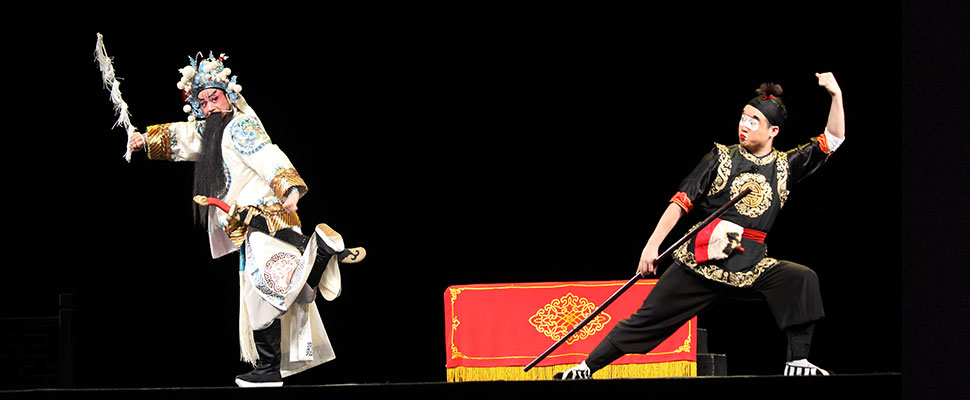
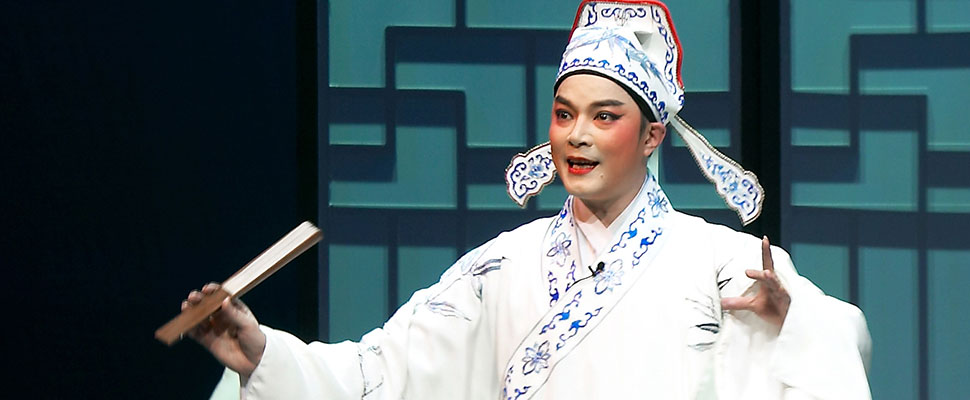
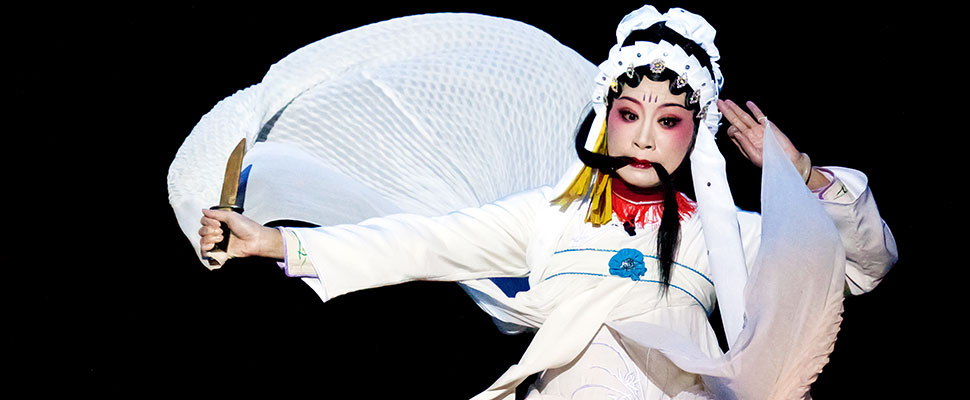
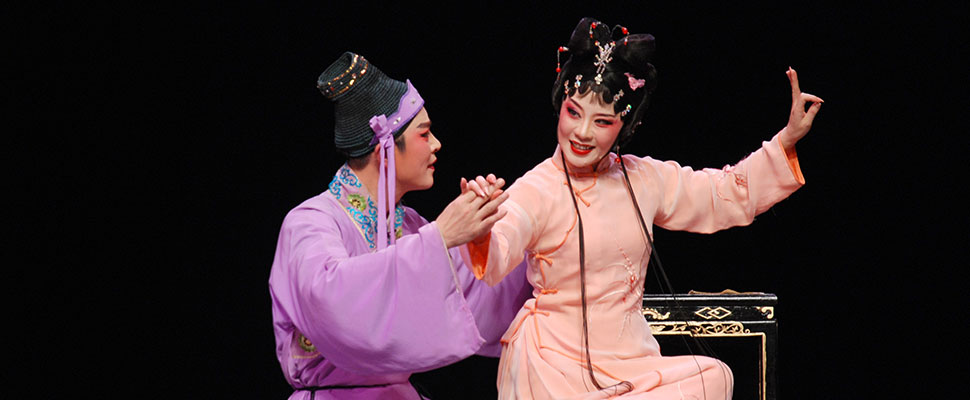
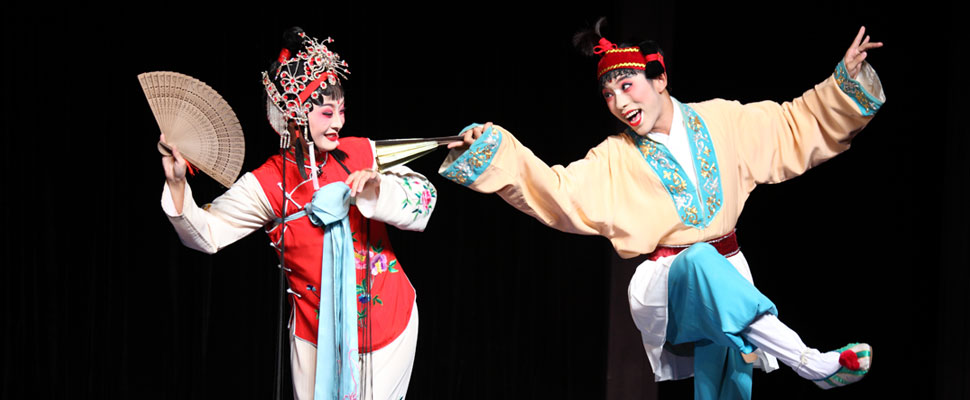
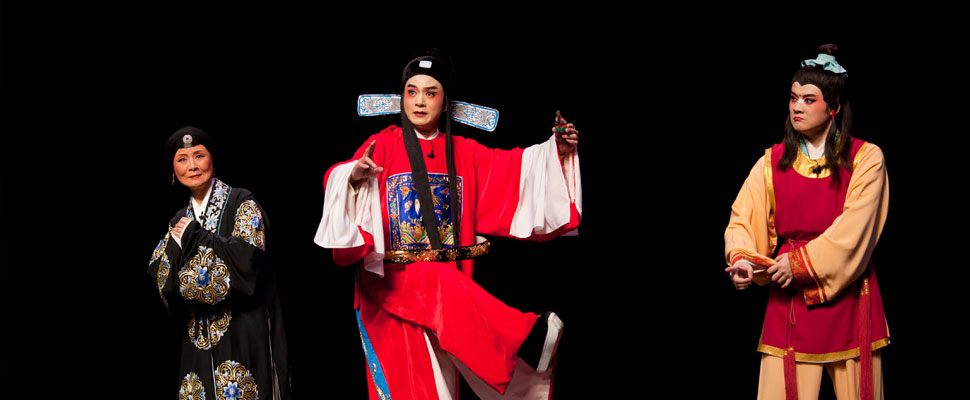
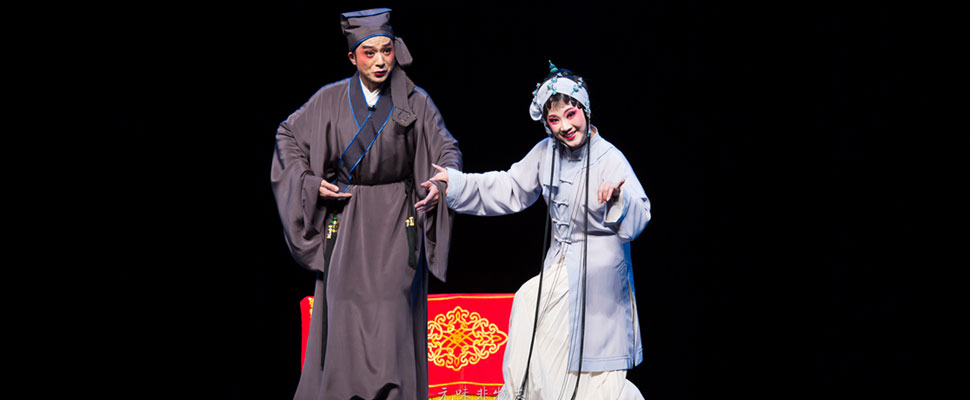










This is a one-act playlet from the traditional repertory of the Xiaoliyuan stream. Some attribute it to an unrecorded work in the themed repertory of The Butterfly Lovers. It contains a lot of dancing movements and incidental music, and retains elements of traditional theatre from the Tang Dynasty.